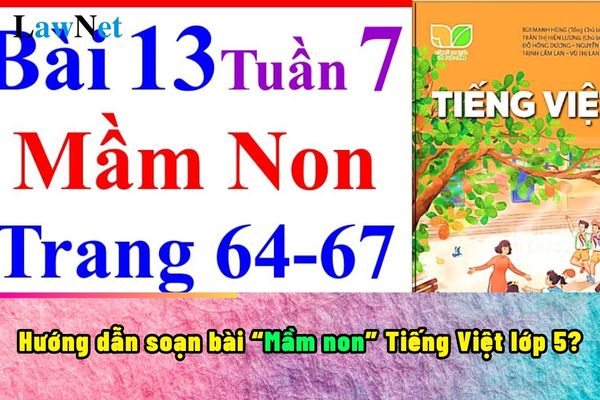What are contents included in the guidelines for preparing the lesson Mầm non for grade 5 students in Vietnam? What is the basic stage when teaching grade 5 Vietnamese Language?
What are contents included in the guidelines for preparing the lesson Mầm non for grade 5 students in Vietnam?
Mầm non is one of the texts that grade 5 students will learn in week 7, lesson 13 (pages 64, 65) – "Kết nối tri thức" curriculum.
Teachers, parents, and students can refer to the following guidelines for preparing the lesson Mầm non for grade 5 students in Vietnam:
|
guidelines for preparing the lesson Mầm non for grade 5 students in Vietnam *Main content and meaning: |
*Note: Information is for reference only./.

What are contents included in the guidelines for preparing the lesson Mầm non for grade 5 students in Vietnam? (Image from the Internet)
What is the basic stage when teaching grade 5 Vietnamese Language?
According to Section I, Appendix of the Primary General Education Curriculum in Literature issued with Circular 32/2018/TT-BGDDT, teaching grade 5 Vietnamese Language has the following characteristics:
Literature is a subject in the field of Language and Literature Education, taught from Grade 1 to Grade 12. At the primary level, this subject is called Vietnamese Language; at the lower and upper secondary levels, it is called Literature.
Literature is both a tool subject and an aesthetic-humanistic subject; it helps students have the means to communicate and serves as a foundation for learning all other subjects and educational activities in school; it is also a crucial tool for educating students about high cultural, literary, and linguistic values; developing in students healthy emotions, humanistic feelings, compassionate and altruistic living.
Through verbal texts and vivid artistic images in literary works, through reading, writing, speaking, and listening activities, Literature plays a significant role in helping students form and develop good qualities and core competencies to live and work effectively, and to learn for life.
The content of Literature is integrated, including knowledge of culture, ethics, philosophy,... related to many subjects and other educational activities such as History, Geography, Arts, Civic Education, Foreign Languages, Science and Society, Experiential Activities, Vocational Guidance,... Literature is also closely related to life; helping students to be more concerned with daily life, to relate and have problem-solving skills in real life.
The core content of the subject includes basic, essential knowledge and skills about Vietnamese and literature, meeting the achievements required for qualities and competencies of students at each level; divided into two stages: basic education stage and career-oriented education stage.
Basic education stage: The curriculum is designed according to the main strands corresponding to the skills of reading, writing, speaking, and listening. Knowledge of Vietnamese and literature is integrated into the teaching process of reading, writing, speaking, and listening. The literature selected and arranged is appropriate for the students' receptive capacity at each education level.
The aim of this stage is to help students proficiently use Vietnamese to communicate effectively in life and learn well in other subjects and educational activities; to form and develop literary competency, an expression of aesthetic competency; and to nurture thoughtfulness and sentimental development to foster students' souls and character.
Career-oriented education stage: The curriculum strengthens and develops the outcomes of the basic education stage, enhancing students' linguistic and literary competency, especially in literary text reception; improving skills in creating more complex expository and informative texts both in content and writing techniques; providing some knowledge of literary history and literary theory that is practical for literary reading and writing; continuing to nurture thoughts, feelings, souls, and character to become responsible citizens.
In addition, each year, students oriented towards social sciences and humanities can choose to study some learning specialties.
These specialties aim to enhance knowledge of literature and language, and skills in applying knowledge to practice, meeting students' interests, needs, and career orientation.
Therefore, at the primary level, this subject is called Vietnamese; at the lower and upper secondary levels, it is called Literature.
Therefore, this is the basic stage when teaching grade 5 Vietnamese Language, so the curriculum is designed according to the main strands corresponding to the skills of reading, writing, speaking, and listening.
Knowledge of Vietnamese and literature is integrated into the teaching process of reading, writing, speaking, and listening. The selected and arranged materials are suitable for the students' receptive capacity at each education level.
What are the 3 goals to achieve when teaching grade 5 Vietnamese Language?
According to Subsection 2, Section III, Appendix of the Primary General Education Curriculum in Literature issued with Circular 32/2018/TT-BGDDT, the goals to achieve when teaching grade 5 Vietnamese Language to students are as follows:
Goal 1: Help students form and develop essential qualities with specific expressions: loving nature, family, homeland; being aware of origins; loving beauty, and goodness and having healthy emotions; having interest in studying, enjoying working; being honest and straightforward in learning and life; being aware of fulfilling responsibilities to oneself, family, society, and the surrounding environment.
Goal 2: Help students initially form general competencies, developing language competency in all skills of reading, writing, speaking, and listening to a fundamental level: reading correctly and fluently text; understanding the content and main information of the text; making connections; comparing beyond the text; writing correctly in orthography and grammar; writing some sentences, paragraphs, short essays (mainly narrative and descriptive essays); speaking clearly; comprehending spoken ideas.
Goal 3: Develop literary competency with requirements to differentiate poetry and stories, knowing how to read poetry and stories; recognizing the beauty of artistic language; having imagination, understand, and being moved by the beauty and goodness of people and the world around them as expressed in literary texts.
>>> DOWNLOAD The General Education Curriculum in Literature issued with Circular 32/2018/TT-BGDDT.

